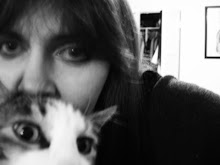
You know how we have to "kid proof" our homes so that they are safe for children?
It's the same for pets, and this is especially for people who are new to having a pet in their home.
I have learned myself that you never know what your kitty (or dog) will find to amuse themselves with next.
OK. This is just a quick check list of your home to make sure. Most of this will seem kind of "duh" but I am sure there are many veterinarians who wonder what on earth pet owners were thinking (or not thinking). Anyway...
It's the same for pets, and this is especially for people who are new to having a pet in their home.
I have learned myself that you never know what your kitty (or dog) will find to amuse themselves with next.
OK. This is just a quick check list of your home to make sure. Most of this will seem kind of "duh" but I am sure there are many veterinarians who wonder what on earth pet owners were thinking (or not thinking). Anyway...
- Wires. There are the obvious things such as electrical cords. Make sure they are not just lying around looking attractive to curious puppies or kittens. It's a good idea to tack them down so that they are less noticeable (don't put the tack through the wire...).
- Sharp objects. This would be the same as the rule with having small children around. Scissors, pins, tacks, nails, razor blades, broken glass. An animal doesn't know if something is potentially dangerous just by looking at it.
- Small objects. Jewelry, twist ties, thread, wool, any sewing supplies, string, rubber bands, paper clips are all choking hazards.
- Houseplants. The following are particularly harmful to cats: Rubber plants, Philodendrons, Mistletoe, Ivy, Hydrangeas, Holly, Narcissus or any forced indoor bulbs, Dieffenbachia (Dumbcane), Cyclamens, Carnations, Caladiums.
- Household Chemicals. Make sure your household cleaners are safely locked away where curious young pups and kitties can't get into investigate. Alot of these things are lethal if ingested and they can't read the directions on what to do if they do ingest..
- Shade and blind pulls. Make sure cords on your blinds are out of reach. Cats can't resist that dangling string but it could strangle them if they get caught in them.
- Doors on Washer/Dryer/Refigerator/Oven. Keep these doors closed. Also check inside often just in case they did find their way in.
- Garbage cans. Keep them securely covered or even out of sight. Old bones or anything we have thrown out could be a potential hazard in the mouth of a pet.
- Close the toilet lid. Self-explanatory but mostly only for younger or smaller pets.
Always make sure, especially new pet owners, you know where your pet is and what they are doing. Pets often hide when they are unwell and finding out as soon as possible could make all the difference in the world.

No comments:
Post a Comment